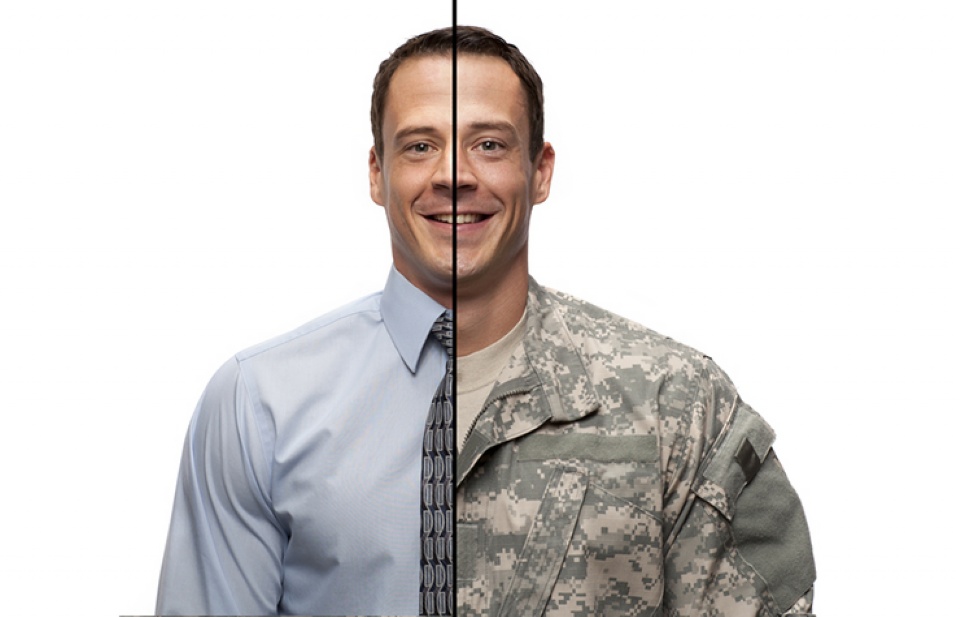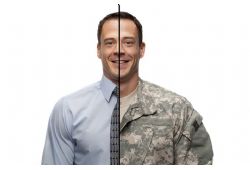At the time this
article was written there were 161 names on the reserves list for the 4th
battalion of the Royal 22nd Regiment in Laval, Quebec. The numbers
fluctuate often, with more recruits joining and anywhere between 20 and 35
awaiting release. Reservists can be your friends, neighbours and even
classmates.
Military service
is something that is widely misunderstood by the public. While it is unlikely
that being stationed for anywhere from six to 18 months or even two years
wouldn’t change you, the effect on a soldier’s psyche is something that is
often difficult to discuss. And when it comes to moving on after service,
mental health issues can be even harder to talk about. Student veterans are 88
per cent more likely to drop out of school, 46 per cent suffer from post
traumatic stress disorder and student veterans are seven times more likely to
take their own lives.
Thankfully for
men and women who are choosing to pursue a university education after the
military or while on reserve, the Concordia Veteran’s Association—the only
association of its kind at a Canadian university—exists to help veterans
transition from military to civilian life.
The association
was founded by Yves Leduc Butterworth, who deployed to Afghanistan in 2009.
When he returned he fell into a slump that made it very difficult to continue
his education. He almost failed out of school because of the troubles he
experienced, including survivor’s guilt.
After he
received help through therapy, he felt a need to aid other veterans who might
be going through something similar, and after years in the making the CVA is
now officially operating.
Nicolas Petitot,
who joined the military in 2004, approached Leduc Butterworth wanting to get
involved. “With what I have gone through and knowing how difficult it is to
start an organisation, I was more than willing to help out my friend,” said
Petitot, who is currently VP external and the strategic advisor for the
association.
Petitot was in a
training accident several years before in Northern Quebec. The injury left him
with short term memory loss that lasted about a month and a half, though it
took him almost two years to acknowledge the post traumatic stress he was
suffering was the result from the incident. Petitot was diagnosed and put on
medication, something that can be very difficult for anyone—especially
soldiers—to admit.
“It’s not
something that a lot of people tend to take well,” explained Petitot, who is
studying linguistics at Concordia. “To say listen, I’m sick, I have a problem,
and this medication is only temporary, instead of using alcohol as a crutch
which I and I’m sure a lot of other veterans have.”
Not all mental
health issues stem from combat, like for Leduc Butterworth, or from an
accident, as with Petitot, however. For Anthony Alliot, VP marketing for the
CVA, who was deployed in Afghanistan, the abrupt transition from military to
school life deeply affected him. “After taking a year off of school I had a
tough time dealing with my first semester,” explained Alliot. “I’ve always done
fairly well in school but I found myself not getting the grades I used to,
struggling to complete pretty easy papers and assignments. Self doubt set in and
it was a bit of a downward spiral for me from that point on.”
To help veterans
like themselves in the Concordia community, the CVA have three “pillars”
inspired by initiatives in American universities; peer support, transition
assistance and veteran’s advocacy.
A mentorship
system for the CVA is the main focus of the peer support pillar, where veterans
in similar programs take classes together to look out for one another. Leduc
Butterworth describes the kind of depression that results from PTSD as a free
fall; “You get a strong sense of isolation, you feel unable to reach out. Not
that you’re necessarily unwilling, you’re actually kind of hoping to have
someone come in and catch you, but it’s just beyond your physical capacity to
reach out.” With the mentorship program, if you notice your partner didn’t come
to class you can check in on them to make sure they’re okay.
Transition
assistance will be provided through workshops in the fall and winter. The fall
workshops will focus on the skills needed to adapt to student life like essay
writing and talking to professors for help—something many veterans can find
difficult.
Winter workshops
will help veterans to transition into the workplace and introduce them to
organisations that support and target veterans for hire. The CVA will also hold
job fairs to show the veterans how to get the most of their degrees.
The most
immediate concern for the CVA is veteran’s advocacy. Soldiers have a tendency
to not ask for help. “We’re told to suck it up throughout our military career,”
said Leduc Butterworth. “If you have a personal problem it’s expected you’re
going to deal with that on your own,” he explained. It’s that mentality,
coupled with mental health issues that can make it extra difficult for a
veteran to come forward if they are having an academic problem. The CVA wants
to be able to identify an issue like an exam deferral and speak on behalf of
the veteran to the student’s professor, dean or ombudsmen when the veteran
cannot.
Veteran’s
advocacy speaks to a larger issue of mental health reform. “When you’re
suffering from PTSD or you’re suffering from depression, you can’t get out of
bed and eat, let alone go down to the doctor’s office and get a note saying ‘my
mind’s hurting,’” said Leduc Butterworth. He hopes to see the system change to
better benefit more students who are suffering from mental health issues.
For now, the CVA
is functioning with eight members on a daily basis but has reached out to a
larger demographic of up to 40 reservists. Their goal, however, is simple; “If
it saves one person’s life then we’ve done our job,” said Petitot.
You can reach
out to the CVA at www.conuvets.ca.

 In The Latest Issue:Latest Issue:
In The Latest Issue:Latest Issue:
- A Bittersweet Farewell
- The new Laval Aquatic Co...
- The End of an Era:
Articles
Calendar
Virtual- ANNUAL TEACHER APPRECIATION CONTEST
- APPUI LAVAL
- ARTS & CULTURE
- CAMPS
- CAR GUIDE
- CCIL
- CENTENNIAL ACADEMY
- CHARITY FUNDRAISING
- CITYTV
- COSMODÔME
- COMMUNITY CONNECTIONS
- COVER STORY
- DINA DIMITRATOS
- ÉCOLE SUPÉRIEURE DE BALLET DU QUÉBEC
- EDITORIALS
- ÉDUCALOI
- EDUCATION
- EMPLOYMENT & ENTREPRENEURSHIP
- FÊTE DE LA FAMILLE
- FÊTE DU QUARTIER SAINT-BRUNO
- FAMILIES
- FESTIVAL LAVAL LAUGHS
- FÊTE DE QUARTIER VAL-DES-BRISES
- FINANCES
- GLI CUMBARE
- GROUPE RENO-EXPERT
- HEALTH & WELL-BEING
- 30 MINUTE HIT
- ANXIETY
- CHILDREN`S HEALTH & WELLNESS
- CLOSE AID
- DENTAL WELLNESS
- EXTREME EVOLUTION SPORTS CENTRE
- FONDATION CITÉ DE LA SANTÉ
- GENERAL
- HEARING HEALTH
- MESSAGES FROM THE HEALTH AGENCY OF CANADA
- MENTAL HEALTH
- SEXUALITY
- SOCIAL INTEGRATION
- SPECIAL NEEDS
- TEENS
- THE NUTRITION CORNER
- THE NUTRITION CORNER - RECIPES
- VACATION DESTINATION
- WOMEN'S FITNESS
- WOMEN'S HEALTH
- HILTON MONTREAL/LAVAL
- HOME & GARDEN
- INTERNATIONAL WOMEN'S DAY
- JAGUAR LAVAL
- LAVAL À VÉLO
- LAVAL FAMILIES TV SHOW
- LAVAL FAMILIES MAGAZINE CARES
- LAVAL URBAN IN NATURE
- LE PARCOURS DES HÉROS
- LES PETITS GOURMETS DANS MA COUR
- LEON'S FURNITURE
- LEONARDO DA VINCI CENTRE
- LFM PREMIERES
- LIFE BALANCE
- M.P. PROFILE
- MISS EDGAR'S AND MISS CRAMP'S SCHOOL
- MISSING CHILDREN'S NETWORK
- NETFOLIE
- NORTH STAR ACADEMY LAVAL
- OUTFRONT MEDIA
- PASSION SOCCER
- PARC DE LA RIVIÈRE-DES-MILLE-ÎLES
- PÂTISSERIE ST-MARTIN
- PIZZERIA LÌOLÀ
- PLACE BELL
- PORTRAITS OF YOUR MNA'S
- ROCKET DE LAVAL
- SACRED HEART SCHOOL
- SCOTIA BANK
- SHERATON LAVAL HOTEL
- SOCIÉTÉ ALZHEIMER LAVAL
- STATION 55
- STL
- SUBARU DE LAVAL
- TECHNOLOGY
- TEDXLAVAL
- TODAY`S LAURENTIANS AND LANAUDIÈRE
- TODAY`S LAVAL
- WARNER MUSIC
- THIS ISSUE
- MOST RECENT
Magazine
CVA: Helping Veterans Transition from Military to Civilian Life
Articles ~e 105,7 Rythme FM 4 chemins Annual Teacher Appreciation Contest Appui Laval Arts & Culture Ballet Eddy Toussaint Camps THIS ISSUE MORE...
CONTESTS Enter our contests
CONTESTS Enter our contests
CALENDAR
Events & Activities
COMMUNITY Posts Events
PUBLICATIONS Our Magazine Family Resource Directory
LFM BUSINESS NETWORK Learn more
COUPONS Click to save!
COMMUNITY Posts Events
PUBLICATIONS Our Magazine Family Resource Directory
LFM BUSINESS NETWORK Learn more
COUPONS Click to save!
SUBSCRIPTIONS
Subscribe to the magazine
Un-Subscribe
E-NEWSLETTER Subscribe to our E-newsletter Un-Subscribe
WRITE FOR US Guidelines & Submissions
POLLS Vote today!
E-NEWSLETTER Subscribe to our E-newsletter Un-Subscribe
WRITE FOR US Guidelines & Submissions
POLLS Vote today!
ADVERTISERS
How to & Media guide
Pay your LFM invoice
SUGGESTIONS Reader's Survey Suggest a Listing
LFM About Us Our Mission Giving Back Contact Us
SUGGESTIONS Reader's Survey Suggest a Listing
LFM About Us Our Mission Giving Back Contact Us
 PICK-UP LOCATIONS
Get a copy of LFM!
PICK-UP LOCATIONS
Get a copy of LFM!
TERMS & CONDITIONS Privacy | Terms
ISSN (ONLINE) 2291-1677
ISSN (PRINT) 2291-1677
Website by ZENxDESIGN




 BY:
BY: 
Tweet
Share